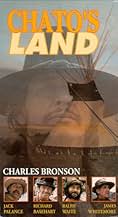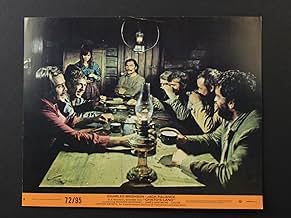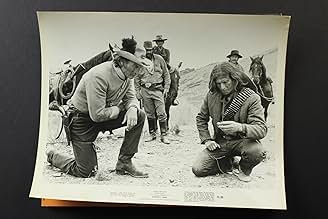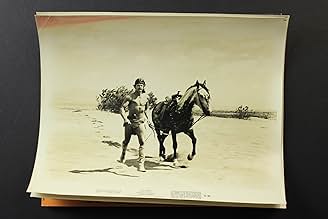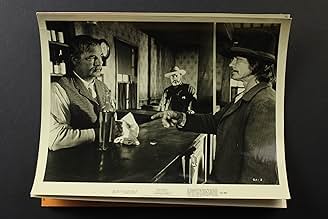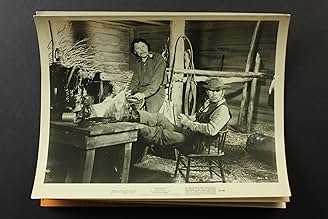NOTE IMDb
6,6/10
6,9 k
MA NOTE
Dans les années 1870 au Nouveau-Mexique, un métis tue un shérif fanatique en légitime défense, mais la bande qui le chasse finalement se retrouve en territoire dangereux.Dans les années 1870 au Nouveau-Mexique, un métis tue un shérif fanatique en légitime défense, mais la bande qui le chasse finalement se retrouve en territoire dangereux.Dans les années 1870 au Nouveau-Mexique, un métis tue un shérif fanatique en légitime défense, mais la bande qui le chasse finalement se retrouve en territoire dangereux.
- Réalisation
- Scénario
- Casting principal
Avis à la une
Chato's Land is directed by Michael Winner and written by Gerry Wilson. It stars Charles Bronson, Jack Palance, James Whitmore, Simon Oakland, Richard Baseheart, Ralph Waite and Richard Jordan. Shot on location in Andalucia, Spain, with photography by Robert Paynter, it's musically scored by Jerry Fielding. Plot finds Bronson as half Apache, Pardon Chato, who is forced to kill the local sheriff in self defence and finds himself being hunted by a town posse led by Captain Quicey Whitmore (Palance). However, as the posse trail him into the wilderness it becomes apparent that the tables have been turned, with Chato given further cause to inflict harm upon his pursuers.
The first of six collaborations between Charles Bronson and Michael Winner, Chato's Land finds the pair setting the marker for what would define their work. With the Western genre going thru a resurgence, Chato's Land is very in-keeping with the type of Western that was being released in the early 70's: namely violent, uncompromising and certainly gritty. These things, as history now shows, were tailor made for Winner, who perfectly utilises Bronson's silent and brooding assets to great effect.
Often suspected to be an allegory of the United States' involvement in Vietnam, it's thematically correct in that respect. But the timing of the film would suggest this to not be the case. Chato's Land is more than just a revenge Western; a film about white men out of their usual terrain being pursued by a man of a different ethnicity, it wants to, and does quite well, be a picture dealing in racism, violence and the folly of hypocritical justice. But even tho Wilson's script brings these issues to light, they are not fully formed, with Winner at times dragging the film to a stand-still. However, the group dynamic is a good one, with the inevitable character differences creating a tinderbox waiting to ignite, while Winner doesn't skimp over the violence, puncturing the narrative with savage thrusts.
Bronson was 50 years old when making the film, his physicality here is very impressive. The role of Chato is hardly a stretch for him, in fact it's very much a perfect fit. He's basically asked to be a phantom in the landscape, but he casts an imposing presence each time he's called on to deliver some Chato justice. In pursuit are a mixed bunch of actors, with Palance, Whitmore and Baseheart the obvious professional standouts, while Simon Oakland leaves an indelible mark as grizzled father of the Hooker boys, Jubal. Fielding's (The Wild Bunch) score is efficient, but workmanlike, and Paynter's (Lawman) photography never really makes the landscape as imposing as it should be. Overall it's a mixed bag, but for fans of revenge type Westerns, and Palance, it's easy to recommend, but it still should have been more intelligent than it ultimately is. 7/10
The first of six collaborations between Charles Bronson and Michael Winner, Chato's Land finds the pair setting the marker for what would define their work. With the Western genre going thru a resurgence, Chato's Land is very in-keeping with the type of Western that was being released in the early 70's: namely violent, uncompromising and certainly gritty. These things, as history now shows, were tailor made for Winner, who perfectly utilises Bronson's silent and brooding assets to great effect.
Often suspected to be an allegory of the United States' involvement in Vietnam, it's thematically correct in that respect. But the timing of the film would suggest this to not be the case. Chato's Land is more than just a revenge Western; a film about white men out of their usual terrain being pursued by a man of a different ethnicity, it wants to, and does quite well, be a picture dealing in racism, violence and the folly of hypocritical justice. But even tho Wilson's script brings these issues to light, they are not fully formed, with Winner at times dragging the film to a stand-still. However, the group dynamic is a good one, with the inevitable character differences creating a tinderbox waiting to ignite, while Winner doesn't skimp over the violence, puncturing the narrative with savage thrusts.
Bronson was 50 years old when making the film, his physicality here is very impressive. The role of Chato is hardly a stretch for him, in fact it's very much a perfect fit. He's basically asked to be a phantom in the landscape, but he casts an imposing presence each time he's called on to deliver some Chato justice. In pursuit are a mixed bunch of actors, with Palance, Whitmore and Baseheart the obvious professional standouts, while Simon Oakland leaves an indelible mark as grizzled father of the Hooker boys, Jubal. Fielding's (The Wild Bunch) score is efficient, but workmanlike, and Paynter's (Lawman) photography never really makes the landscape as imposing as it should be. Overall it's a mixed bag, but for fans of revenge type Westerns, and Palance, it's easy to recommend, but it still should have been more intelligent than it ultimately is. 7/10
A tale of western revenge, "Chato's Land" has a cast of many well known actors including Jack Palance, Richard Basehart, Simon Oakland, Ralph Waite, Victor French and James Whitmore as well as Bronson in the lead role as Pardon Chato.
Chato is a half-breed Apache who makes the mistake of visiting a town that is hostile towards Indians. Being set upon by the sadistic town Marshall, Chato kills the lawman in self defense and must run from a posse of the town's people led by Jack Palance as Quincy Whitmore. Palance is excellent as Whitmore, an ex-Confederate officer who still longs after the excitement that comes from waging war. Leading the town's men in pursuit of Chato, Whitmore is decked out in his Confederate officer's jacket and plummed hat. Along with Whitmore is Nye Buell (Basehart) dressed in top hat and frock coat offering his whiskey laden salty commentary along the way. Simon Oakland also does a fine job as Jubal Hooker, the vicious elder of the degenerate Hooker clan who takes control of the posse from Quincy and ultimately cause the death of several of the posse members.
This movie has some beautifully set scenery that captures the harshness of the desert land that Chato takes refuge in. Whitmore comments that the harsh land is something that a white man would just damn off to hell and forget, but to Chato who doesn't ask much or take much from the land, it is almost a living thing.
Chato is a half-breed Apache who makes the mistake of visiting a town that is hostile towards Indians. Being set upon by the sadistic town Marshall, Chato kills the lawman in self defense and must run from a posse of the town's people led by Jack Palance as Quincy Whitmore. Palance is excellent as Whitmore, an ex-Confederate officer who still longs after the excitement that comes from waging war. Leading the town's men in pursuit of Chato, Whitmore is decked out in his Confederate officer's jacket and plummed hat. Along with Whitmore is Nye Buell (Basehart) dressed in top hat and frock coat offering his whiskey laden salty commentary along the way. Simon Oakland also does a fine job as Jubal Hooker, the vicious elder of the degenerate Hooker clan who takes control of the posse from Quincy and ultimately cause the death of several of the posse members.
This movie has some beautifully set scenery that captures the harshness of the desert land that Chato takes refuge in. Whitmore comments that the harsh land is something that a white man would just damn off to hell and forget, but to Chato who doesn't ask much or take much from the land, it is almost a living thing.
Michael Winner's "Chato's Land" of 1972 starring the great late Charles Bronson and the equally grand Jack Palance, who also passed away recently, is a tough-minded and violent English Western which should not be missed, and a must-see for every Bronson fan. Director Winner, who is most famous for his violent 1974 cult classic "Death Wish", is certainly one of the masters of uncompromising revenge cinema and "Chato's Land", Winners first collaboration with Bronson, is one of the movies which have rightly earned him this reputation.
When half-breed Apache Pardon Chato (Bronson) shoots a racist Sheriff in self defense in a Saloon, local men form a posse to catch him, in order to hang him as soon as possible. The posse is lead by former Confederate Captain Quincy Whitmore, who is more keen on the manhunt just for the good old times than out of hate towards Chato. The sadistic Hooker brothers who have also joined the posse, however, hate Indians of any kind, and they don't have the slightest scruples of doing anything to make the fugitive pay for defending himself. As the posse members get deeper and deeper into the desert of Indian territory, however, they have to find out that they might have underestimated their opponent. This is Chato's land, and in Chato's land the hunters can quickly become the hunted...
The acting in "Chato's Land" is great, Charles Bronson, who hardly says a word fits perfectly into his role. Jack Palance is superb in his role of Capt. Quincy Whitmore, and I couldn't imagine anybody else but Bronson and Palance to play the leading parts in this. Simon Oakland and Richard Johnson are also great in their ugly roles of Jubal Hooker and his psychopathic little brother Earl, and the cast furthermore contains Richard Basehart. The film is very well photographed in the Spanish Almería, certainly the best location for European Westerns.
"Chato's Land" is a brutal, tough-minded and great Western, which should not be missed by anybody who likes revenge movies. The performances are excellent, and the movie is stunning, raw and atmospheric from the beginning to the end. A must-see for Charles Bronson fans, Chato's Land is a great film. Highly recommended.
When half-breed Apache Pardon Chato (Bronson) shoots a racist Sheriff in self defense in a Saloon, local men form a posse to catch him, in order to hang him as soon as possible. The posse is lead by former Confederate Captain Quincy Whitmore, who is more keen on the manhunt just for the good old times than out of hate towards Chato. The sadistic Hooker brothers who have also joined the posse, however, hate Indians of any kind, and they don't have the slightest scruples of doing anything to make the fugitive pay for defending himself. As the posse members get deeper and deeper into the desert of Indian territory, however, they have to find out that they might have underestimated their opponent. This is Chato's land, and in Chato's land the hunters can quickly become the hunted...
The acting in "Chato's Land" is great, Charles Bronson, who hardly says a word fits perfectly into his role. Jack Palance is superb in his role of Capt. Quincy Whitmore, and I couldn't imagine anybody else but Bronson and Palance to play the leading parts in this. Simon Oakland and Richard Johnson are also great in their ugly roles of Jubal Hooker and his psychopathic little brother Earl, and the cast furthermore contains Richard Basehart. The film is very well photographed in the Spanish Almería, certainly the best location for European Westerns.
"Chato's Land" is a brutal, tough-minded and great Western, which should not be missed by anybody who likes revenge movies. The performances are excellent, and the movie is stunning, raw and atmospheric from the beginning to the end. A must-see for Charles Bronson fans, Chato's Land is a great film. Highly recommended.
Released in 1972, "Chato's Land" is typically written off as lame Spaghetti Western with Charles Bronson but, actually, it's a UK production shot in Spain, Mexico and Arizona. And, secondly, there's more depth here than the one-dimensional racist-revenge plot might first lead you to believe.
I'll admit that I was turned off to this movie for years due to Brian Garfield's scathing review in his excellent book "Western Films," where he called it "cheesy, dreary, phony," but an open-minded and honest viewing proves him wrong. Yes, it's dreary, but it's not cheesy or phony. It's true that the desolate Spanish locations are phony, in that it's not the American Southwest, but other than that the characters and dialogue ring true.
The plot is simple: Chato, a half-breed Indian (Charles Bronson), shoots an arrogant, racist lawman in a saloon and a large posse is assembled where they chase Chato in his own element, which is why it's called "Chato's Land."
Bronson's role is taciturn, one-dimensional and almost invisible, until the end where he's a stunning example of masculine strength. Amazingly, Bronson was 50 years-old during filming, but he was in prime physical condition with not an iota of fat. Another reviewer commented that, if he were 6'5", he would've made a perfect Conan the Barbarian.
Bronson's striking presence and solemn performance is key to the success of the movie, of course, but the film's true strength is the writing/directing and the stellar cast that make up the posse, including Jack Palance, Richard Basehart, James Whitmore, Simon Oakland, Ralph Waite, Richard Jordan and more. The group dynamics of the posse and their interplay is where the film shines. Four or five of the men are good men, but they're too blinded by cultural bigotry toward a half-breed to realize the injustice of their cause. It never occurs to them that Chato has rights and that the slain lawman was in the wrong. All they focus on is that a sheriff is dead and a half-breed did it. Most of the rest of the posse are unlikable or repugnant, particularly a character played by Richard Jordan and his father, played by Simon Oakland.
Due to their differences, the loosely put-together posse lacks solidarity. Some are hell-bent on apprehending or killing Chato while others are rather half-hearted on the issue, pretty much just doing a favor for the former Confederate Captain, played by Palance. You have to listen closely because sometimes the dialogue isn't too clear, but the quality writing brings these characters to life.
Why does Chato become increasingly merciless as the story progresses? At first, he does things to simply deter the group and provoke them to give up, like destroy their water supply, but at a certain point some of the members of the posse cross the line and do something particularly heinous, not to mention utterly criminal, proving that they are the true criminals and not Chato. Some of the members object, which is respectable, but not enough to stop the atrocities and so they become guilty by association. It's called cowardly condoning.
As for the slightly ambiguous ending, what's the point? Chato need not kill when Chato's land will do it for him. That's why it's called "Chato's Land."
The score is decent with a compelling percussive part, but some aspects are too dated. An exceptional score would've propelled a good Western into greatness or near-greatness. Also, some of the editing is too abrupt and awkward. Still, despite its one-dimensional plot, "Chato's Land" is a quality Western. With all due respect, Brian Garfield was wrong.
The film runs 110 minutes, but there are versions that cut-out about four minutes of R-rated material.
GRADE: B
I'll admit that I was turned off to this movie for years due to Brian Garfield's scathing review in his excellent book "Western Films," where he called it "cheesy, dreary, phony," but an open-minded and honest viewing proves him wrong. Yes, it's dreary, but it's not cheesy or phony. It's true that the desolate Spanish locations are phony, in that it's not the American Southwest, but other than that the characters and dialogue ring true.
The plot is simple: Chato, a half-breed Indian (Charles Bronson), shoots an arrogant, racist lawman in a saloon and a large posse is assembled where they chase Chato in his own element, which is why it's called "Chato's Land."
Bronson's role is taciturn, one-dimensional and almost invisible, until the end where he's a stunning example of masculine strength. Amazingly, Bronson was 50 years-old during filming, but he was in prime physical condition with not an iota of fat. Another reviewer commented that, if he were 6'5", he would've made a perfect Conan the Barbarian.
Bronson's striking presence and solemn performance is key to the success of the movie, of course, but the film's true strength is the writing/directing and the stellar cast that make up the posse, including Jack Palance, Richard Basehart, James Whitmore, Simon Oakland, Ralph Waite, Richard Jordan and more. The group dynamics of the posse and their interplay is where the film shines. Four or five of the men are good men, but they're too blinded by cultural bigotry toward a half-breed to realize the injustice of their cause. It never occurs to them that Chato has rights and that the slain lawman was in the wrong. All they focus on is that a sheriff is dead and a half-breed did it. Most of the rest of the posse are unlikable or repugnant, particularly a character played by Richard Jordan and his father, played by Simon Oakland.
Due to their differences, the loosely put-together posse lacks solidarity. Some are hell-bent on apprehending or killing Chato while others are rather half-hearted on the issue, pretty much just doing a favor for the former Confederate Captain, played by Palance. You have to listen closely because sometimes the dialogue isn't too clear, but the quality writing brings these characters to life.
Why does Chato become increasingly merciless as the story progresses? At first, he does things to simply deter the group and provoke them to give up, like destroy their water supply, but at a certain point some of the members of the posse cross the line and do something particularly heinous, not to mention utterly criminal, proving that they are the true criminals and not Chato. Some of the members object, which is respectable, but not enough to stop the atrocities and so they become guilty by association. It's called cowardly condoning.
As for the slightly ambiguous ending, what's the point? Chato need not kill when Chato's land will do it for him. That's why it's called "Chato's Land."
The score is decent with a compelling percussive part, but some aspects are too dated. An exceptional score would've propelled a good Western into greatness or near-greatness. Also, some of the editing is too abrupt and awkward. Still, despite its one-dimensional plot, "Chato's Land" is a quality Western. With all due respect, Brian Garfield was wrong.
The film runs 110 minutes, but there are versions that cut-out about four minutes of R-rated material.
GRADE: B
A laconic Apache is pursued by a posse to solve a sheriff's death , dead in self-defense showdown by Chato (Charles Bronson) . Stalking the misfit group who are allegedly to be chasing him , after they attack his woman and family . A veteran confederate officer (Jack Palance) leads the posse (Victor French , James Withmore , Lee Patterson) along with three brutal brothers (Richard Jordan , Simon Oakland , Ralph Waite). Chino struggles to maintain his livelihood and later on , he seeks revenge .
This offbeat Western film displays excessive violence , noisy action and orgies of destruction of life and property . It's full of fury , sound , sadism and gratuitous violence . Characters are beaten, killed and raped . Pretty good Charles Bronson in his ordinary tough role , this film is one of Charles Bronson's 70s westerns ; his westerns made during the 1970s include Red sun (1971), Chato the Apache (1972), From noon till three (1976), Nevada Express (1975) and The White Buffalo (1977) . For Charles Bronson fans , it's full of what made his movies so popular . Although isn't among Bronson's stronger , this is one of his more viscerally effective movies . Striking and atmospheric musical score by Jerry Fielding , Sam Peckinpah's usual . Colorful cinematography by Robert Paynter reflecting splendidly the barren outdoors from Almeria (Spain) , as usual . The motion picture was well directed by Michael Winner . This is the first film out of six that Charles Bronson and Michael Winner made together . Winner had important commercial successes in the mid-70 with his fetish actor , Charles Bronson , achieving various box-office hits, such as ¨Deathwish I and II, furthermore, ¨The mechanics¨ and ¨The stone killer¨.
This offbeat Western film displays excessive violence , noisy action and orgies of destruction of life and property . It's full of fury , sound , sadism and gratuitous violence . Characters are beaten, killed and raped . Pretty good Charles Bronson in his ordinary tough role , this film is one of Charles Bronson's 70s westerns ; his westerns made during the 1970s include Red sun (1971), Chato the Apache (1972), From noon till three (1976), Nevada Express (1975) and The White Buffalo (1977) . For Charles Bronson fans , it's full of what made his movies so popular . Although isn't among Bronson's stronger , this is one of his more viscerally effective movies . Striking and atmospheric musical score by Jerry Fielding , Sam Peckinpah's usual . Colorful cinematography by Robert Paynter reflecting splendidly the barren outdoors from Almeria (Spain) , as usual . The motion picture was well directed by Michael Winner . This is the first film out of six that Charles Bronson and Michael Winner made together . Winner had important commercial successes in the mid-70 with his fetish actor , Charles Bronson , achieving various box-office hits, such as ¨Deathwish I and II, furthermore, ¨The mechanics¨ and ¨The stone killer¨.
Le saviez-vous
- AnecdotesCharles Bronson refused to play in the scene where he saves a naked woman. He refused because she was without clothes. Director Michael Winner eventually used a trick to make the scene without Bronson's agreement.
- GaffesSeveral times as the posse rides through the desert, the saguaro cacti props in the background can be seen jiggling and flapping their arms in the wind.
- Citations
Capt. Quincey Whitmore: Apaches don't leave tracks unless they got a reason.
- Crédits fousThere are no closing credits or an end title--merely a simple cut to black.
- Versions alternativesThe original UK cinema version was cut for violence and the later Warner video received 41 secs of cuts to horsefalls and the rape scene, though the print used was missing the shooting of the burning Indian and a shot of Jubal Hooker's face being hit with a rock. In 2004 most of the cuts were waived with only 14 seconds now missing to remove sight of horses being made to fall in a fashion that is prohibited under BBFC Policy and also by the Cinematograph (Animals) Act of 1937.
- ConnexionsFeatured in Kain's Quest: Rambo: First Blood Part II (2018)
Meilleurs choix
Connectez-vous pour évaluer et suivre la liste de favoris afin de recevoir des recommandations personnalisées
Détails
Box-office
- Montant brut aux États-Unis et au Canada
- 421 031 $US
Contribuer à cette page
Suggérer une modification ou ajouter du contenu manquant


